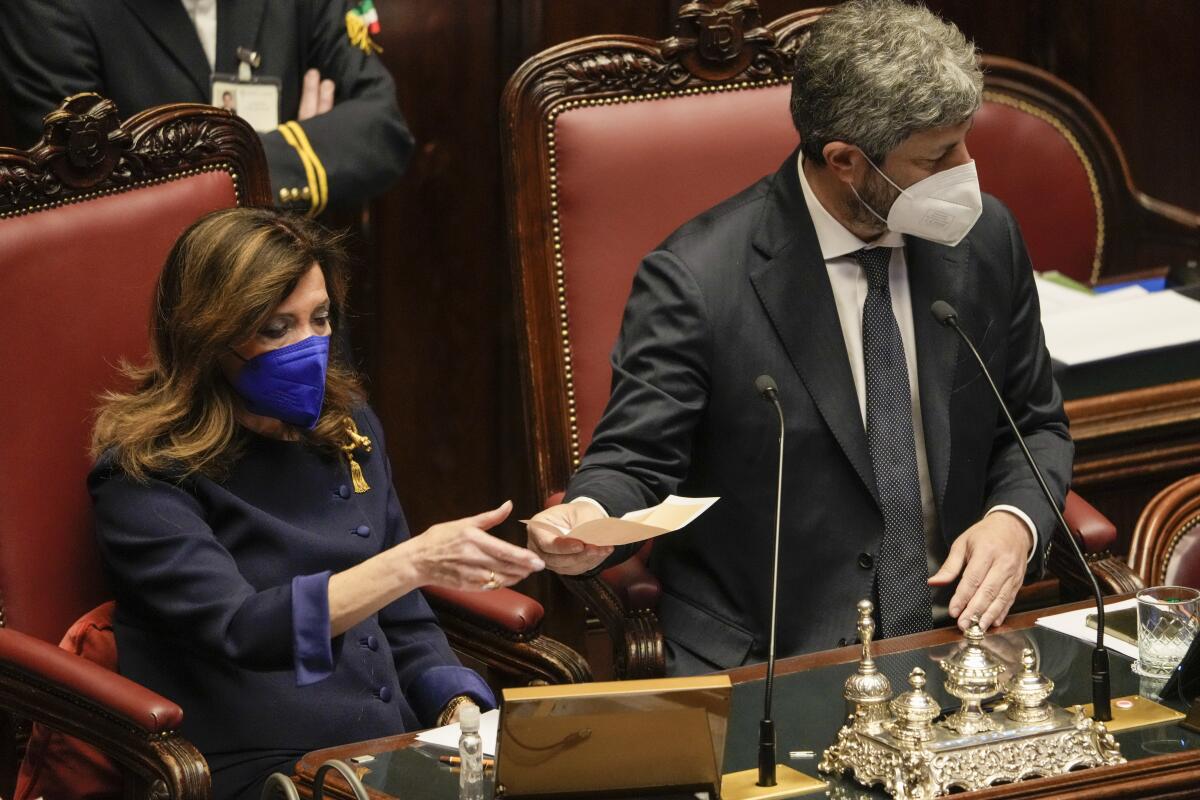Italian lawmakers again fail to elect a new president, with no deal in sight

- Share via
ROME — Insistence by Italy’s center-right bloc that one of their candidates is vaulted to the country’s presidency backfired Friday, as tensions and frustration mounted among the rival parties forming Prime Minister Mario Draghi’s pandemic unity government and a fifth day of voting yielded no winner.
In each of two rounds of voting on Friday, one political bloc or the other abstained in droves from casting ballots, making plain how far lawmakers were from agreeing who should be Italy’s next head of state.
At the start of the fifth day of voting, right-wing League party leader Matteo Salvini declared that the center-right bloc would vote for the Senate president, Maria Elisabetta Alberti Casellati. Her political career’s springboard has been the conservative Forza Italia party of former Prime Minister Silvio Berlusconi, who bowed out as a candidate before voting began this week.
But her candidacy garnered only 382 votes among Parliament’s Senate, Chamber of Deputies and special regional electors, far short of the majority of 505 needed for victory.
A sixth round of balloting, held Friday evening, also yielded no winner, with leaders from the center-right bloc indicating their electors were sitting out that round while behind-the-scenes negotiations continued.
Outgoing President Sergio Mattarella, 80, has repeatedly said he doesn’t want a second term despite appeals from some party leaders in recent weeks. He recently rented an apartment in Rome, preparing for his move out of the presidential Quirinal Palace when his term ends Feb. 3.
But with political consensus so far failing to materialize, lobbying could swell to persuade him to change his mind. In Friday’s evening round, Mattarella gained the most votes — 336 — indicating that for the time being, at least, no other name was ripe to attract significant traction.
Balloting continues Saturday morning.
Neither of the two major blocs in Parliament — the center-right and center-left — has the necessary majority. Secret voting means the risk for defections is high.
Under the Constitution, the head of state is a largely ceremonial figure who represents national unity. The president, however, helps to authoritatively mediate Italy’s frequent political squabbling in its coalition governments and can dissolve Parliament if it becomes hopelessly stalemated.
Traditionally, parties across the spectrum come together to elect a head of state who is supposed to be above the partisan fray during the seven-year tenure. Three former prime ministers, Democratic Party chief Enrico Letta, centrist leader Matteo Renzi and populist 5-Star Movement Giuseppe Conte, have been working behind the scenes to try to forge consensus and have reached out to the center-right to come up with a candidate suitable to all.
Consensus must be developed around “a shared candidate, impartial,” Conte told reporters.
Draghi has left the door open for himself to be chosen as president.
But Salvini and Berlusconi have insisted that he stay in the prime minister’s office to help guarantee the smooth delivery and implementation of some $225 billion in pandemic recovery funds. That has compounded anxiety that any move by Draghi on the presidency could fuel political instability and trigger elections a year ahead of time. The prospect spooks some political leaders whose parties haven’t fared well in recent local or regional elections.
Analysts in Italy and abroad have said the squabbling among the blocs will hurt whatever political stability the country benefited from by having Draghi at the helm over the last year. The former European Central Bank chief is credited with saving the euro single-currency and is widely respected in the European Union.
“Regardless of its outcome, the divisive presidential election will significantly affect Draghi’s government, as the coalition parties now are extremely divided and reconciling these differences will be hard,” London-based analyst Wolfango Piccoli at Teneo, a consulting and advisory firm, said in an emailed commentary.
More to Read
Sign up for Essential California
The most important California stories and recommendations in your inbox every morning.
You may occasionally receive promotional content from the Los Angeles Times.













